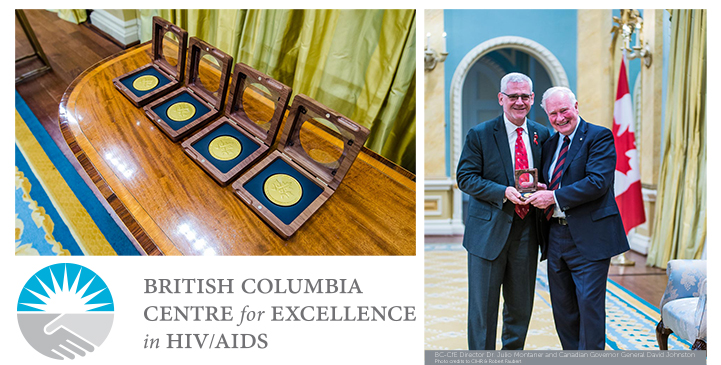
In recognition of the BC Centre for Excellence in HIV/AIDS’ (BC-CfE) 25 years of leadership in the battle against HIV/AIDS Dr. Julio Montaner was in Ottawa on May 16th, 2017 to accept the CIHR Gold Leaf Prize for Impact on behalf of the staff of the BC-CfE.
The CIHR Gold Leaf Prize for Impact is awarded to an individual or team that demonstrates proven impact on health outcomes, practices, policies, and on the health system. The award acknowledges the role the BC-CfE has played for over 30 years developing effective treatment and providing care for those living with HIV/AIDS, educating health professionals worldwide, and promoting evidence-based policy to protect people and populations from the virus.
“I was incredibly proud to accept this award on behalf of the BC Centre for Excellence in HIV/AIDS,” said Dr. Julio Montaner, Director, BC-CfE. “Throughout its history, the BC-CfE has been a leader in tackling one of the world’s deadliest diseases with an innovative and compassionate approach. The Gold Leaf Prize is recognition of the ground-breaking work of the scientists, doctors, researchers, health care providers and community members. All who tackled the complex challenges presented by the HIV/AIDS virus in the early days, developed innovative treatments and advocated for those most impacted by the disease.”
Since 1981, the year HIV/AIDS first appeared in North America, an estimated 39 million people have died of AIDS worldwide. In British Columbia in the early 1990s, one person was dying of AIDS almost every day. Since then, as a result of the innovation by BC-CfE and the introduction of life-saving drug therapies, HIV has become a chronic and manageable disease for those who can access highly active antiretroviral treatment (HAART).
In the early days of the HIV/AIDS crisis, innovation drove Dr. Montaner and the Centre’s early successes in transforming the lethal Pneumocystis pneumonia (PCP), the most frequent cause of death among HIV-infected individuals, into a treatable and preventable condition. Over the following decade, the Centre’s work on the development of new drugs and therapies lead to Dr. Montaner’s landmark study establishing the ability of NNRTI-based triple drug therapy (later known as HAART) to suppress HIV replication and put the disease into full and lasting remission.
The BC-CfE continued to lead advancements in the area of HIV/AIDS, with Dr. Montaner spearheading the single most successful example of knowledge translation in the history of medicine. Montaner used the Vancouver Conference to disseminate the emerging HAART strategy, ensuring it was accepted as the new standard of care by the end of the conference – 12 to 18 months before the research was published in peer-reviewed journals.
Providing full and early access to crucial drug treatments to all, including marginalized communities, and ensuring universal coverage is the concept behind Treatment as Prevention (TasP), an approach pioneered by Dr. Julio Montaner. Based on its success in improving quality of life and longevity of HIV/AIDS patients, while reducing the spread of illness, TasP has been adopted by jurisdictions including Brazil, China, France, Panama, Spain, major US cities, and the state of Queensland in Australia. In 2015, a widely covered US National Institutes of Health (NIH) clinical study based in 35 countries, confirmed what the BC-CfE had been advocating for many years: early treatment is best to improve health outcomes and reduce transmission.
Since 1992, the BC-CfE has provided evidence to support policies and programs that improve the health and welfare of populations most vulnerable to HIV and other related diseases. From leading the development of new treatments for HIV/AIDS to pioneering the advancement of the TasP model, the BC-CfE has grown to include 375 staff and a research laboratory, drug treatment program, epidemiology and population health program, the Urban Health Research Initiative and the Gender and Sexual Health Initiative.

